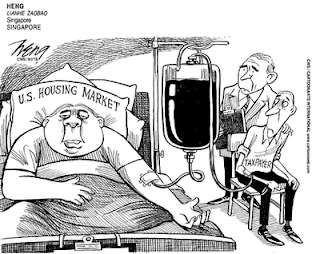Wow: Sun article shows the downside of government subsidies

Let's give credit where credit is due. The Sun has an excellent article today on why the first-time homeowner tax credit is good politics and terrible policy.
No doubt, a big tax break for first-time homebuyers is good politics.I might disagree with some of the article's later suggestions, but let's just enjoy this bout of economic clarity from an unexpected source while we can.
The $8,000 tax credit, enacted this year when Congress passed the $800 billion stimulus program, helps families looking to buy a house for the first time, as well as real estate agents and developers, who are ailing in the face of the worst housing market since the Depression.
Nevada more than just about any other state could use help for its beleaguered construction industry; unemployment in construction in Clark County has climbed into the high 20s and could reach 50 percent this year, according to labor union officials.
So it's not surprising that Nevada's congressional delegation has signed on to a plan to extend the credit and even make it more generous.
"It's working," says Rep. Dina Titus, the 3rd District Democrat. "You can see the positive impact of it. It really is stimulating the economy, helping Realtors and developers and homebuilders and individual homebuyers."
Although the politics are a surefire winner, especially here in Nevada, some economists across the political spectrum question whether the tax credit is good policy.
"It's terrible policy," says Mark Calabria of the libertarian Cato Institute.
"It's awful policy," says Andrew Jakabovics, associate director for housing and economics at the liberal Center for American Progress. "It's incredibly expensive. It's not well targeted."
Home sales have risen dramatically in the past year, but most economists don't attribute the increase to the tax credit. August single-family-home sales in Southern Nevada, for instance, hit 3,229, up more than 25 percent from a year earlier.
But economists attribute most of the rising sales to the plunge in prices, not the tax credit. The median sale price of single-family homes was off more than 35 percent from a year earlier.
"A heck of a lot of people would have bought the house anyway," says Ted Gayer, an economist at the Brookings Institution.
According to an estimate by the National Association of Realtors, of the 2 million new homebuyers since the credit was instituted, 350,000 say they would not have bought a house without the tax break.
"We paid $8,000 to at least 1.5 million people to do something they were going to do anyway," Jakabovics says.
The tax break, due to expire at the end of November, is on track to cost $15 billion, twice what Congress had planned. In other words, it will cost $43,000 for every new homebuyer who would not have bought a house without the tax break.
The biggest disappointment for those who care about limited government is that Nevada's entire Congressional delegation supports extending and expanding this government handout. Have they all missed the message of the Tea Parties? Most disappointing is Rep. Dean Heller, because we know he knows why this is a bad policy.
Government shouldn't pick the winners (first-time homeowners) and the losers (everyone else). Don't any of Nevada's elected officials know that demand for new cars plummeted after the Cash for Clunkers program ended?
Instead, they want another housing bubble for Nevada.





